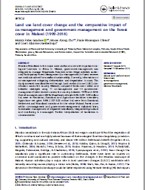Miombo Woodland is the major Land use/land cover with important ecological functions in Africa. In Malawi, government-management was designed to manage Woodlands. However, when illegal activities continued, Participatory Forest Management (co-management) in forest reserves was institutionalised for woodland sustainability. Currently, information on co-management mitigating deforestation and degradation is scant. This study assessed woodland/forest through Land use/land cover (LULC) classification across the country (Malawi); compared forest cover within and between strategies using 11 co-management and 12 governmentmanagement forest reserves across the country between 1999 and 2018. Overall accuracies were >90%. Woodland net loses 8.4% (4.39–3.39 million ha) were to Plantation, Grassland and Agriculture transition intensities. Agriculture net gains 9.6% (1.87–3.00 million ha) were from Grassland, Settlement and Woodland transitions for the whole Malawi. Forest cover within co-management and government-management indicated loses. Sustainable management of degraded woodlands, integrated Agriculture and monitoring is encouraged. Further interpretation of transitions is recommended.

